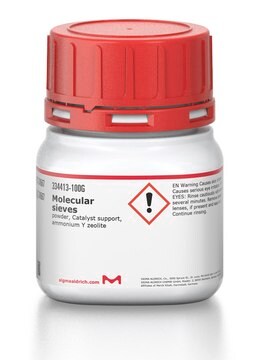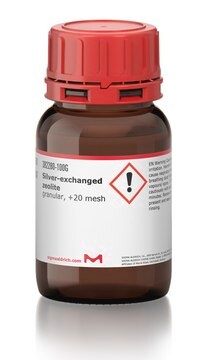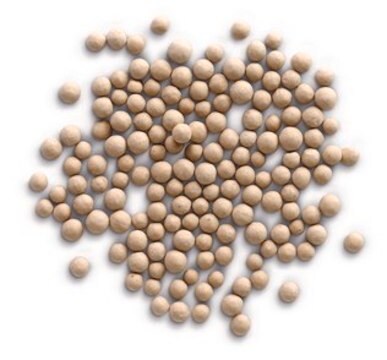96096
Zeolith
Synonym(e):
Aluminosilicate
Anmeldenzur Ansicht organisationsspezifischer und vertraglich vereinbarter Preise
Alle Fotos(1)
About This Item
Empfohlene Produkte
Suchen Sie nach ähnlichen Produkten? Aufrufen Leitfaden zum Produktvergleich
Allgemeine Beschreibung
Choosing a Molecular Sieve:
1. The preferential adsorption of one molecule over another depends upon pore diameter and mesh size.
2. The dynamic capacity of the silica gel for adsorbing a particular compound is governed by the internal surface area; the greater the surface area, the greater the dynamic capacity.
3. Rate of adsorption and sharpness of resolution are dependent chiefly on particle size and column packing; a fine particle size gives optimum sharpness of resolution.
4. Liquids are most readily adsorbed from solvents in which they are least soluble; a good solvent makes a good desorbing agent.
5. Highly polar liquids are readily adsorbed. Compounds having hydroxyl groups, or containing oxygen are strongly adsorbed.
6. For similar compounds, the higher the molecular weight the higher the selectivity.
7. For hydrocarbons of similar molecular weight, adsorptivity increases with the number of double bonds.
1. The preferential adsorption of one molecule over another depends upon pore diameter and mesh size.
2. The dynamic capacity of the silica gel for adsorbing a particular compound is governed by the internal surface area; the greater the surface area, the greater the dynamic capacity.
3. Rate of adsorption and sharpness of resolution are dependent chiefly on particle size and column packing; a fine particle size gives optimum sharpness of resolution.
4. Liquids are most readily adsorbed from solvents in which they are least soluble; a good solvent makes a good desorbing agent.
5. Highly polar liquids are readily adsorbed. Compounds having hydroxyl groups, or containing oxygen are strongly adsorbed.
6. For similar compounds, the higher the molecular weight the higher the selectivity.
7. For hydrocarbons of similar molecular weight, adsorptivity increases with the number of double bonds.
Regeneration or Activation:
A saturated molecular sieve can be restored to its original capacity by regeneration, the principle of which involves changing the conditions surrounding the adsorbent to correspond to a very low equilibrium capacity. In general, the greater the difference between the equilibrium capacities of adsorption and regeneration, the more rapid and complete the regeneration.
The sieve may be regenerated in one of four ways:
1. Thermal reactivation –The maximum regeneration temperature for Silica is 300°C.
2. Pressure reactivation
3. Passing an appropriate fluid through the gel bed at normal temperature and pressure.
4. Displacement of adsorbates by passing a high concentration of molecules in a fluid through the bed.
A saturated molecular sieve can be restored to its original capacity by regeneration, the principle of which involves changing the conditions surrounding the adsorbent to correspond to a very low equilibrium capacity. In general, the greater the difference between the equilibrium capacities of adsorption and regeneration, the more rapid and complete the regeneration.
The sieve may be regenerated in one of four ways:
1. Thermal reactivation –The maximum regeneration temperature for Silica is 300°C.
2. Pressure reactivation
3. Passing an appropriate fluid through the gel bed at normal temperature and pressure.
4. Displacement of adsorbates by passing a high concentration of molecules in a fluid through the bed.
Anwendung
Zeolite, a microporous, aluminosilicate mineral, is used as a molecular sieve and as an adsorbent of a wide variety of cations, such as Na+, K+, Ca2+, Mg2+ and others. Zeolite is used in the development of a variety of bioreactor devices.
Sonstige Hinweise
In the determination of serum triglycerides
Lagerklassenschlüssel
11 - Combustible Solids
WGK
nwg
Flammpunkt (°F)
Not applicable
Flammpunkt (°C)
Not applicable
Persönliche Schutzausrüstung
Eyeshields, Gloves, type N95 (US)
Analysenzertifikate (COA)
Suchen Sie nach Analysenzertifikate (COA), indem Sie die Lot-/Chargennummer des Produkts eingeben. Lot- und Chargennummern sind auf dem Produktetikett hinter den Wörtern ‘Lot’ oder ‘Batch’ (Lot oder Charge) zu finden.
Besitzen Sie dieses Produkt bereits?
In der Dokumentenbibliothek finden Sie die Dokumentation zu den Produkten, die Sie kürzlich erworben haben.
Benzylimidazolium cations as zeolite structure-directing agents. Differences in performance brought about by a small change in size.
Rojas A, Gomez-Hortiguela L, Camblor MA.
Dalton Transactions (2012)
Lactic acid production on liquid distillery stillage by Lactobacillus rhamnosus immobilized onto zeolite.
Djukic-Vukovic AP, Mojovic LV, Jokic BM, et al.
Bioresource Technology (2012)
Thomas Simons et al.
Beilstein journal of nanotechnology, 3, 667-673 (2012-12-06)
In a proof-of-concept study we demonstrate in situ reaction monitoring of DeNO(x)-SCR on proton-conducting zeolites serving as catalyst and gas sensor at the same time. By means of temperature-dependent impedance spectroscopy we found that the thermally induced NH(3) desorption in
Mehran Andalib et al.
Bioresource technology, 121, 411-418 (2012-08-07)
The primary objective of this work was to investigate the treatability of thin stillage as a by-product of bioethanol production plants using an anaerobic fluidized bed bioreactor (AFBR) employing zeolite with average diameter of (d(m)) of 425-610 μm and specific
C Mery et al.
Journal of environmental science and health. Part A, Toxic/hazardous substances & environmental engineering, 47(3), 420-427 (2012-02-11)
An evaluation of natural zeolite as a microorganism carrier in nitrifying reactors operated in batch mode was carried out. Specifically, the influence of zeolite particle sizes of 0.5, 1.0 and 2.0 mm in diameter on microorganism adherence to zeolite, ammonium
Unser Team von Wissenschaftlern verfügt über Erfahrung in allen Forschungsbereichen einschließlich Life Science, Materialwissenschaften, chemischer Synthese, Chromatographie, Analytik und vielen mehr..
Setzen Sie sich mit dem technischen Dienst in Verbindung.





